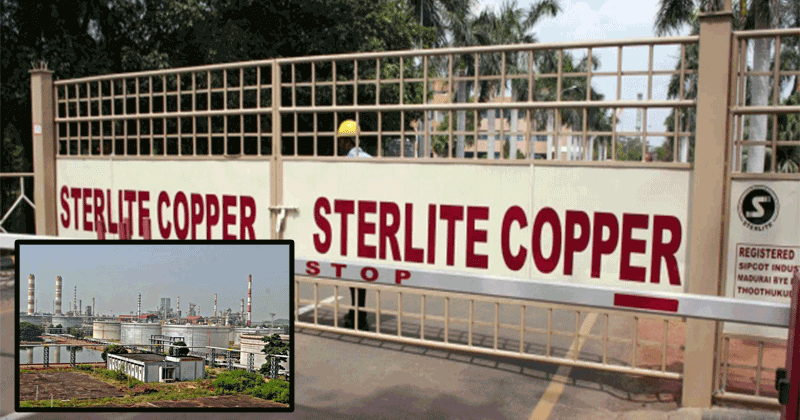
Sterlite Company in Tuticorin has been facing protests for the past 3 months, and on its 100th day (22nd May) the protests had turned violent, killing 12 of the protestors.
The political bigwigs had visited the protest victims in the hospital and had demanded a probe into the matter.
Meanwhile, nearly 32,500 jobs have been axed in Tuticorin as Sterlite Copper deals with the fallout of the violent protests and the scheduled, as well as forced, a shutdown of the copper smelting plant. The protests claimed 12 lives while twenty-four others were injured.
Sterlite Copper’s Tuticorin plant employs 3,500 directly and another 30,000-40,000 indirectly. Of the direct employees, 2,500 are contract workers who have been issued notices under ‘force majeure’ clause of their contracts, said Sterlite Copper CEO P Ramnath. The company has retained the 1,000 employees on its rolls for the time being. Nearly all of the 30,000 indirect employees will be jobless since they earned their living from units associated with the company such as suppliers, logistics, transport, copper wire units and other allied activities. These jobs will remain suspended as long as the plant is in shutdown.
The protests have been on for nearly 100 days. However, they took a turn for the worse when protestors began ransacking and putting vehicles and public property on fire. Police action claimed nearly a dozen lives. Madurai bench of the Madras High Court has also stayed the doubling of Sterlite Copper’s capacity from 4 lakh tonnes to 8 lakh tonnes at Tuticorin.
Not to mention that the state government has decided to cut off the power supply to the Sterlite plant. The Power Board has taken the initiative on the instructions of the Pollution Board.
READ ALSO: Government to provide anti- Sterlite details to Center; HC stops company
The company claims it is currently in a once-in-four-year planned and ‘extended’ shut down for 45 days since March 27 for repairs and maintenance activities. The planned shutdown ends in the first week of June. However, the Tamil Nadu Pollution Control Board has refused to renew the licence to operate the plant since April, citing three major violations: that the plant does not comply with environmental laws, has dumped copper slag in the river and has failed to provide reports of the groundwater analysis of nearby borewells. Sterlite denies all these charges. However, the TN Pollution Control Board has rejected the company’s application to renew the licence to operate the plant beyond March 2018.
“The government has not yet renewed the consent to operate. We have approached the appellate tribunal. The next hearing is on June 6. Hopefully, we should be able to get a verdict on that. Based on that we will take it forward,” says Ramnath.
Ramnath is unsure as to why the TN Pollution Control Board has not cleared the licence for the plant to operate. He said, “I don’t know. The reasons would be best known to them. Whatever reasons they have stated these are things we’ve already been complying with. They themselves have been coming on a monthly basis and taking groundwater sample.”
IS THE PLANT CAUSING CANCER TO THE LOCALS?
“These are all unfounded rumours being propagated. This plant has been there for the last 20 years and we have families who live just half a kilometre away from the plant. All these families are living proof that there is nothing wrong. They are spreading rumours that cancer in Tuticorin is because of the copper. If you look at hard data, out of the 32 districts in Tamil Nadu, Tuticorin comes somewhere 14th or 15th in cancer among males and 25th in cancer among females. Chennai and Kanchipuram are in the top 6. There is no correlation and no proof of what they are saying,” said the CEO.
DUMPING SLAG IN RIVER
Ramnath insisted that the plant has not dumped copper slag in a river. He said “That is also not true. The pollution control board has itself approved usage of copper slag for landfill. Nearly eight years ago we had sold this material to a third party for landfill in his low-lying area. He has used this slag for landfill. His plot of land is next to a (water) channel. Over eight years, the course of the water has changed and because of that, the soil has got eroded. Some of the slags has come into the water. We are being held responsible for that after eight years of having sold that for a landfilling application.”

Post Your Comments